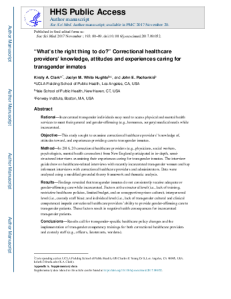
Kirsty A Clark; Jaclyn M. White Hughto; John E. Pachankis; Social Science & Medicine
Keywords: Best Practices; Gender-Affirming Care; Healthcare; Juvenile Justice; Secure Facilities; Transgender Youth
Findings revealed that transgender inmates do not consistently receive adequate or gender-affirming care while incarcerated. Factors at the structural level (i.e., lack of training, restrictive healthcare policies, limited budget, and an unsupportive prison culture); interpersonal level (i.e., custody staff bias); and individual level (i.e., lack of transgender cultural and clinical competence) impede correctional healthcare providers’ ability to provide gender-affirming care to transgender patients. These factors result in negative health consequences for incarcerated transgender patients.
Results call for transgender-specific healthcare policy changes and the implementation of transgender competency trainings for both correctional healthcare providers and custody staff (e.g., officers, lieutenants, wardens). [Summary from resource.]
File : pdf with 0.36 MB in size
Clark, K. A., White Hughto, J. M., & Pachankis, J. E. (2017). “What’s the right thing to do?” Correctional healthcare providers’ knowledge, attitudes and experiences caring for transgender inmates